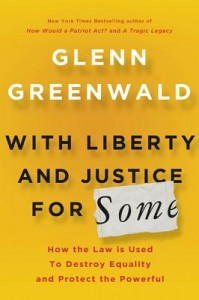 Glenn Greenwald’s With Liberty and Justice for Some is an extremely important book. I don’t exaggerate when I say it’s a book everyone in the United States should read, something I don’t normally say about even my favorite books.
Glenn Greenwald’s With Liberty and Justice for Some is an extremely important book. I don’t exaggerate when I say it’s a book everyone in the United States should read, something I don’t normally say about even my favorite books.
Greenwald makes the case in the United States today, rule of law is disappearing. Instead, we have what he calls “The Principle of Elite Immunity,”–the idea that political and business elites are never to be punished for their crimes, except perhaps if their crimes harm other elites. Greenwald blames the current mindset on Ford for pardoning Nixon and justifying the pardon on the grounds that prosecuting Nixon would be too divisive.
Now, personally, I don’t think the pardon of Nixon would have been such a bad thing if it had been a one-time thing and the country had gotten back on course afterwards. However, Greenwald convincingly argues that the Nixon pardon was the beginning of a pattern of bad excuses for forgiving any and all high-level wrong doing in this country. Thus, we get pardons for Iran-Contra criminals, Bill Clinton suppressing inquiry into Regan and Bush’s illegally providing of weapons to Iraq in spite of having promised investigations, and Obama’s failure to prosecute the crimes of the Bush administration.
It’s important to stress that the excuses really are ridiculous–read the book for the full recitation, but here’s one especially bad example, both in terms of the flimsiness of the rationale and the fact that it was given by a member of our government’s alleged watchdog, the media. When Bush pardoned Defense Secretary Caspar Weinberger for multiple felony counts of perjury and obstruction of justice in connection with Iran-Contra, Richard Cohen, on the grounds that Cohen had run into Weinberger quite a few times at Safeway, and he seemed like an OK guy to Cohen.
One of the strongest sections of the book is the coverage of the NSA wiretapping scandal and the decision to grant telecoms immunity for breaking the law on behalf of the Bush administration. Previously, I had known about the scandal, but had simply filed it away in my brain as one of the lesser crimes of the Bush administration. However, Greenwald explains how by granting the telecoms retroactive immunity for breaking the law, Democrats (and Congress was controlled by Democrats at the time) passed on a rare opportunity to get an actual investigation into Bush’s crimes.
Several other things stick out about the telecom immunity story. First, Congress’ actions can’t be defended on the grounds that the telecoms thought what they were doing was legal, because under the original law that was a valid defense. Second, the telecom immunity bill was written with heavy influence from corporate lobbyists, a troubling example of how, in Greenwald’s words, “major corporations literally write our nation’s laws.” Third, as a senator Obama went back on an initial promise to help block telecom immunity. Had I known that fact when Obama was elected, his other lapses in office would have surprised me less.
By comparison, the discussion of lawbreaking in relation to the 2008 financial crisis was a bit weak. It includes quotes from a number of authorities, including Alan Greenspan saying that much of what happened was “just plain fraud,” and cites one case where a former CEO was found to have committed fraud but was allowed to settle his case with a fine of $67, a fraction of the half-billion dollars he made while the fraud was going on. However, unlike most parts of the book, the laws that were supposedly broken are never explained clearly.
In fairness to Greenwald, part of his point is that the financial crisis was never thoroughly investigated, making it hard to know what crimes were or were not committed. Still, given all the anger at Wall Street right now, the book could have benefited a lot from more clarity on that point. Also, Greenwald’s focus on lawbreaking means that his mention of how lobbyists managed to get important regulations repealed doesn’t have a clear place in his narrative, and I wonder if that wasn’t the bigger problem (though it would still be a sign of how corrupt our government is).
Anyway, With Liberty and Justice for Some is an excellent book in spite of this complaint, and telecom immunity and the financial crisis are only two examples of the problems Greenwald covers. So go buy the book, even if you think you know all about these problems. Looking at any one incident in isolation, it’s tempting to say, “Okay, that was bad, but I’m sure it won’t happen again.” Greenwald, however, makes clear that we suffer from a recurring pattern of elites committing serious crimes and getting de facto immunity for doing so, a pattern that will likely continue until we do something to stop it.

Will definitely check it out.